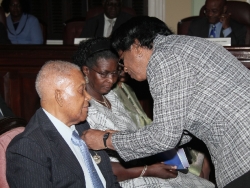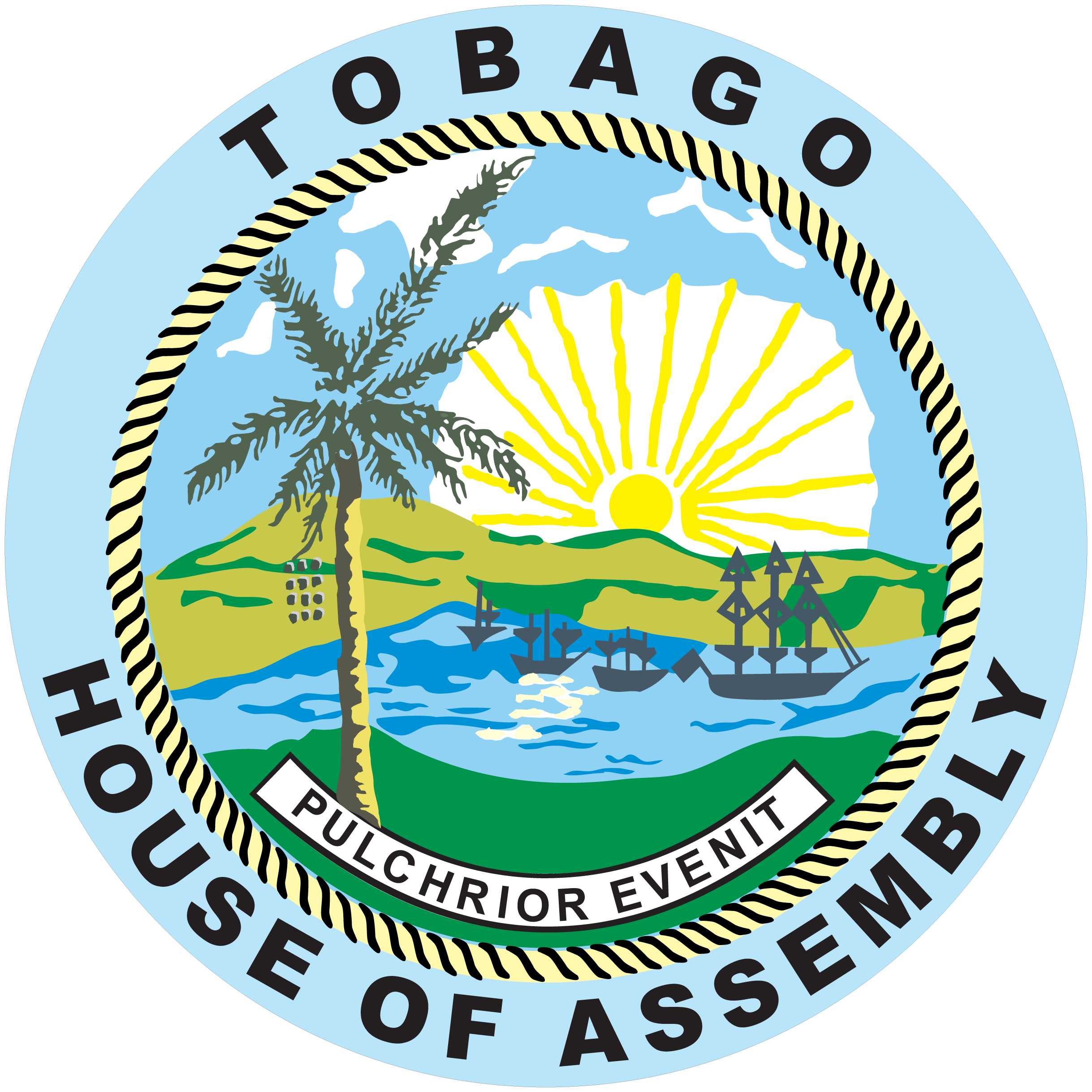
House of Assembly Presiding Officer Ann Mitchell-Gift presented the award to Robinson, the first chairman of the Assembly and a former prime minister, along with two posthumous awards to Tobago’s first Member of the Legislative Council, James Biggart; and former Member of Parliament for Tobago, APT “Fargo” James.
In presenting the awards Mitchell-Gift said the Tobago Medal of Honour was the highest mark of distinction that the Assembly can confer on the island’s citizens. “It is reserved for individuals whose contribution to the development of Tobago has been exceptional,” she added.
She said in this inaugural year, the three persons being awarded the Medal have distinguished themselves as architects of the development of Tobago, having attained the status of icons in Tobago’s historical landscape. She said: “Their service to this country has been characterised by excellence and thus merits Tobago’s highest honour.”
The THA Presiding Officer noted that the Assembly had unanimously passed a motion on March 24 2011 to establish the award.
After accepting the award Robinson who has been in public life for over 50 years said he felt honoured to have been recognised by his fellow Tobagonians for his hard work towards the development of Tobago and Trinidad and Tobago.
Robinson who was born at Calder Hall on December 16 1926 is the only person in the history of the nation to have held three of the highest public offices: The first Chairman of the Tobago House of Assembly; Prime Minister of Trinidad and Tobago; and President of the Republic of Trinidad and Tobago. He is widely acknowledged internationally as a visionary who has made a significant contribution to human rights. He was elected to the Federal Parliament in 1955 and in 1961 he was elected to the Trinidad and Tobago Parliament as representative for Tobago East. In 1962, Robinson was appointed the nation’s first Minister of Finance and was given the responsibility for restructuring the country’s financial institutions and for the reform of monetary policy for a newly independent Trinidad and Tobago.
During this time in Parliament Robinson was a strong advocate for the restoration of the long defunct Tobago House of Assembly to allow the people of Tobago a greater degree of self determination. In November 1980, he was installed as first Chairman of the modern Tobago House of Assembly, thus leading the island in a new chapter of its history.
He has been responsible for several initiatives in regional development and jurisprudence. These include the Caribbean Regional Economic Conference, the Caribbean Court of Appeal and the West Indian Commission of the Commonwealth. In 1989, during the 44th Session of the United Nations General Assembly, he proposed the creation of a permanent international court which eventually led to the inauguration of the International Criminal Court in 2002, commissioned to hear cases of crimes against humanity. He has received many honours for this and his other achievements. In May 2011, the Crown Point International Airport was renamed after him.
Biggart was born in Pembroke on June 6, 1877, distinguishing himself very early by excelling in business and at his profession as a pharmacist. He also contributed to a wide range of activities for the development of Tobago and was involved in church work, social welfare, sport, and in municipal reform. He promoted facilities for the intellectual improvement of citizens, donating a building as a place for debates, discussion and reading in 1911.
His passion was education. From as early as 1909, Biggart advocated the establishment of a secondary school for both sexes to have access to secondary education, which at the time, was the preserve of the wealthy. Biggart is recorded as being the key person to persuade Bishop Anstey to establish a school in Tobago. The Bishop’s High School opened its doors in 1925, the first secondary school in the island and the first co-educational school in the nation. His other notable achievements include the introduction of two inter-island vessels which significantly improved sea communication between Trinidad and Tobago; the establishment of the Windward Road from Speyside to Charlotteville, which allowed wheeled traffic to enter Charlotteville for the first time in 1930; the establishment of a market at Roxborough and a police station at Moriah.
James has been described as “Tobago’s most ardent advocate for political, social and economic development”. His parliamentary representation of Tobago from 1946 to 1961 is remembered with great admiration by those of his time and by historians.
He was born in Patience Hill in 1901 and received his early education and training in Tobago. In 1928 he migrated to La Brea, Trinidad where his advocacy for working class rights found expression. He collaborated with trade union leaders of the time, such as Arthur Cipriani, Albert Gomes and Tubal Uriah Butler. During this time, he established a name for himself as a contractor and as a benevolent supporter of those in need.
In 1946 universal adult suffrage was granted to Tobago and James was elected to the Legislative Council by an overwhelming majority Council. His focus ranged from the poor state of sea communication between Trinidad and Tobago to the need for agricultural development. He insisted that the island should embrace the teaching of agriculture in its schools, recommending the establishment of a farm school and demanding the establishment of a secondary school in Roxborough to service the needs of the children at the eastern end of the island.
He fought for better roads for the electrification of Tobago and the development of a strong tourist industry. So committed was he to the needs of his constituents that in 1948 he paid his own way to London to take his concerns to the Secretary of State for the Colonies. He was indefatigable in his insistence that Tobago should be given two representatives in the Legislature and consistently decried what he saw as Tobago’s disadvantaged position in the Caribbean.
His efforts gave a head start to the growth of the tourism industry. The North Coast Road and the Hillsborough Dam were built and the airport upgraded. In 1952, a new harbour was opened in Scarborough. Later, new coastal steamers were acquired and a new hospital built. The foundation of a more modern Tobago was established during this era of the island’s history by its determined representative.
